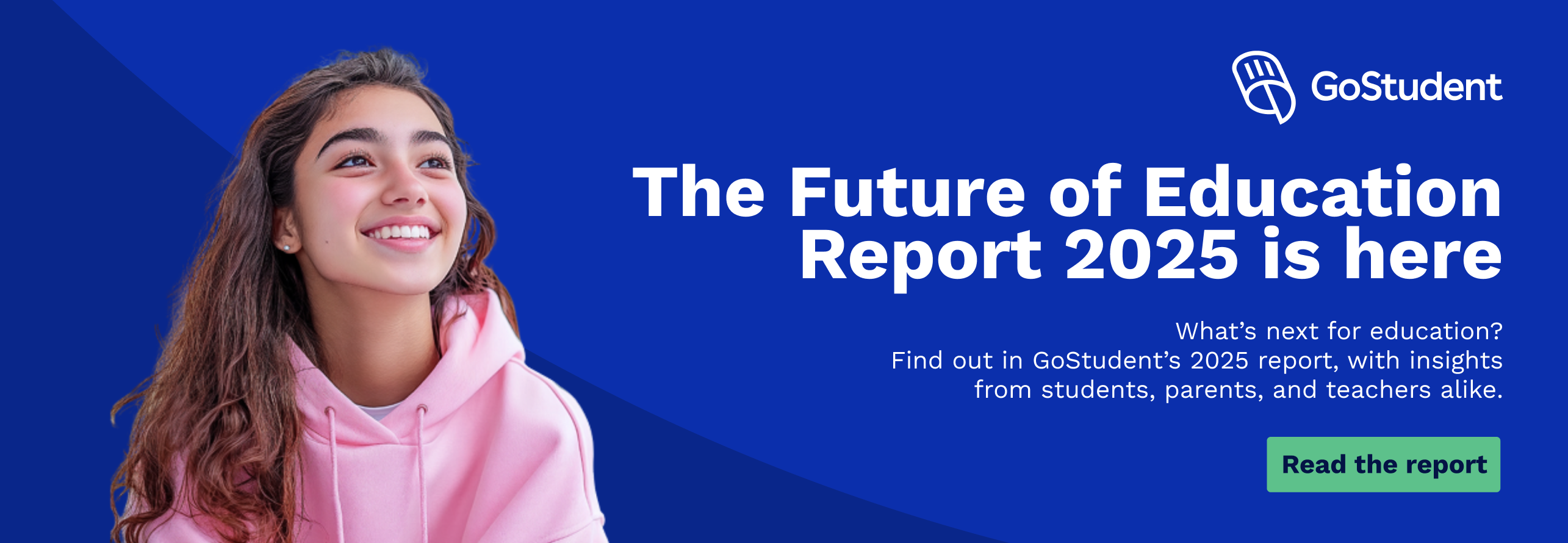- Eye-Opening AI Statistics in UK Schools
- What Students Really Think About AI
- How Teachers View and Use AI
- What Parents Think About AI in Education
- The Pros and Cons of AI in the Classroom
- Common Applications of AI in Education Sector Today
- How Will AI Change the Way We Learn?
- Curriculum Readiness: Is the UK Falling Behind?
- Final Thoughts: What These Stats Tell Us
The Rise of AI in British Education Sector
Artificial intelligence is no longer just a buzzword, it's already having a significant impact on how students learn, how teachers plan lessons, and how schools operate across Europe, including the UK.
From personalised support to smart lesson planning and feedback systems, AI technologies are steadily transforming the learning experience. But while adoption is growing, many schools still lag behind, struggling to integrate these tools effectively.
In this article, we unpack the most revealing AI in education statistics from the GoStudent Future of Education Report 2025, based on responses from over 5,800 parents, students aged 10–16, and 300 teachers across six European countries, including the UK.
🔑 Key Takeaways: AI Education Statistics in the UK
- 30% of UK students already use AI tools in school, yet only 31% have learned about AI from teachers.
- 74% of teachers say they’ve had no AI training, a major barrier to meaningful integration.
- 24% of students are teaching themselves; 25% via social media.
- Confidence is dropping: only 61% of students feel prepared for a tech-driven world (down from 77%).
- 58% of UK teachers believe personalised learning should be built around AI support.
- 46% of students hope to be taught by virtual tutors or avatars in the future.
- 68% of parents see value in screen time for learning, but 54% worry about overdependence.
- AI is seen as assistive, not a replacement, 59% of teachers support a hybrid human + AI model.
- Access remains unequal: 31% of private schools offer AI tutors, vs. 17% of state schools.
- Only 10% of teachers believe students won’t need AI in the next 2 years, but schools are underprepared.
🤖 Eye-Opening AI Statistics in UK Schools
The UK is among the most technologically advanced countries in Europe, and this shows in the education sector, particularly in how schools are beginning to explore AI usage for everything from administrative tasks to teaching students. Still, a gap remains between student behaviour, institutional planning, and teachers’ attitudes.
Usage of AI Among UK Students:
- 30% of UK students use AI tools at school.
- 35% say they’ve used AI specifically to support learning, compared to 26% overall.
- 62% of students wish their teachers were more knowledgeable about AI.
- 24% of students are teaching themselves AI through trial and error.
- UK students learn AI from social media (25%) nearly as much as from teachers (31%).
- 15% of UK students claim they never use AI tools.

🔧Common AI Tools Used by Students
Most Common AI Tools in UK Schools include writing assistants, generative artificial intelligence platforms, intelligent tutoring systems, and AI-powered educational games that adjust difficulty based on student performance.
|
AI Tool |
% Need Now |
% Need in 2 Years |
|---|---|---|
|
Generative AI |
37% |
35% |
|
AI Language Learning Tools |
29% |
29% |
|
Writing Assistants |
22% |
29% |
|
Voice Assistants |
19% |
21% |
|
Coding Tools |
17% |
20% |
|
Maths Tools |
16% |
23% |
|
Adaptive Learning Tools |
14% |
20% |
|
Note-Taking Assistants |
13% |
18% |
|
Research Tools |
13% |
17% |
|
Picture Tools |
10% |
15% |
These statistics suggest that students expect a broad range of AI tools to be part of their education, not just flashy tech, but core learning aids built into their daily schoolwork and revision.
🎓 What Students Really Think About AI
While most young people see AI as a crucial part of their future careers, they’re often left to explore it on their own. Schools are not consistently integrating AI use into the curriculum, and there’s a sense that students are teaching themselves faster than schools can keep up.
- Only 31% of UK students say they’ve learned about AI from their teachers.
- 61% say they feel confident living in a tech-driven world, a drop from 77% the year before.
- 53% believe robots will be a normal part of classrooms by 2030.
- 46% of students hope to be taught by virtual avatars or tutors in the future.
🧑🏫 How Teachers View and Use AI
There’s both optimism and frustration among UK teachers. Many support AI's potential, but few have the tools or training to use it effectively.
- 74% of UK teachers have not received any AI training.
- 71% say AI access should be supervised, not banned.
- 59% believe the best way to teach is via human teachers supported by AI tools.
- 50% of UK teachers say students will need access to generative AI tools within 2 years.
- 58% of UK teachers believe personalised education should be built around AI.
- Teachers think that soft skills such as emotional intelligence (32%), critical thinking (%40) and problem-solving (%41) will only grow in importance in an AI age.

👨👩👧 What Parents Think About AI in Education
Parents in the UK are aware of AI’s benefits, especially when it comes to academic performance and tutoring support, but many have expressed concerns about online misinformation, screen time, and unequal access.
- 68% of UK parents see benefits in screen time for online learning.
- 48% hope AI will offer virtual tutors to support their child’s education.
- 38% believe their child would fall behind without AI tools, while another 38% disagree.
- 36% of UK parents use parental control apps to limit exposure to misinformation.
- 43% of UK parents say they themselves struggle to distinguish fact from fake news.
- 59% of UK parents say teachers must learn more about AI to support students.
⚖️ The Pros and Cons of AI in the Classroom
Like any technology, AI brings both exciting benefits and potential pitfalls. Here’s how it breaks down for the UK:
✅ Benefits of AI in Education
- 24/7 learning support: AI tutors are available any time.
- Personalised feedback: AI helps identify weak points and tailors learning paths.
- Reduced admin time: Teachers report AI helps cut down on marking and prep.
- SEN support: 44% of parents of children with special educational needs believe AI tools can offer better personalisation.
- 46% of UK parents hope artificial intelligence will reduce admin and free up teachers to focus on students.
⛔ Risks and Concerns
- 54% of parents worry kids are becoming too dependent on artificial intelligence.
- Over-reliance on AI is the #1 reason parents and teachers say they hesitate to introduce it in school (23%) and at home (24%)
- 47% of UK teachers think students struggle to tell what’s real or fake online.
- 59% of parents believe that without online access, their children will not be prepared for the world of work.
- Only 10% of UK teachers believe students won’t need access to AI tools in the next two years, yet many schools still lack a clear plan for safe and effective use.
- 31% of fee-paying UK schools have AI tutors/homework helpers vs. just 17% in non-fee-paying schools.
🧪 Common Applications of AI in Education Sector Today
Across the UK, schools and tutors are beginning to integrate AI into everyday education, not just for novelty, but to solve practical problems like admin overload, personalisation, and student engagement.
- GoStudent uses AI to match students with personalised tutors and offers AI summaries of lessons.
- AI-powered educational games are being used to reinforce concepts in maths, science, and language learning.
- Language apps now include AI-driven feedback systems for accent and grammar.
- Some schools use intelligent tutoring systems to identify gaps and adjust lesson difficulty in real-time.
- Planning lessons and generating classroom materials with generative AI is helping reduce teacher prep time.
🔮 How Will AI Change the Way We Learn?
The big question: will AI replace teachers?
Short answer? No.
- Only 10% of UK teachers and 11% of parents believe AI will replace educators.
- 59% of teachers and 51% of parents think the best model is a mix of human teachers supported by artificial intelligence.
- The UK's curriculum still lags behind the real pace of tech evolution, but 70% of teachers agree artificial intelligence will be central to students’ careers.
📘 Curriculum Readiness: Is the UK Falling Behind?
The UK national curriculum has been called outdated by educators. Despite AI's rise, there’s no dedicated unit on AI literacy or digital resilience. Many educational institutions lack structured approaches for introducing AI-powered tools into core subjects.
- The 2024 Curriculum and Assessment Review is expected to tackle these gaps, but implementation is still slow.
- Meanwhile, students feel they’re being left to self-teach skills that will define their future careers.
📌 Final Thoughts: What These Stats Tell Us
Artificial intelligence is already playing a central role in classrooms, often led by students themselves. But schools, teachers, and policy frameworks have not yet adapted to support safe, effective AI use, let alone train students in academic integrity and responsible tech usage.
To move forward, the UK education system must:
- Provide AI training to all teachers
- Build artificial intelligence literacy into the national curriculum
- Ensure equal access to AI tools for all schools
- Promote ethical usage of AI in schoolwork, lesson planning, and revision
If done right, artificial intelligence can transform education into something more inclusive, personal, and future-ready, rather than a divide between the tech-prepared and the left-behind.
These innovations are part of GoStudent’s broader vision for the future of learning. You can explore our full AI-focused insights in the GoStudent Future of Education Report 2025.




.jpg?upsize=true&upscale=true&width=100&height=100&name=math-square-root%20(1).jpg)


